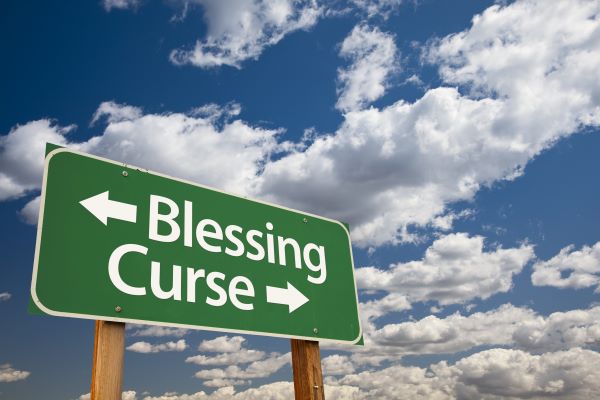Choose Blessing
By Jim Huskins
McDowell County
Many take stock of their lives at this time of year and express thanks for God’s mercy and bounty. Every good thing comes from above, and forgiveness of sin tops the list. Without salvation by grace through faith, none of us could enter into God’s presence.
Christians typically believe that God “blesses” us because we “go to church” or tithe, but the Bible teaches that blessing follows obedience. Several passages clarify this connection. I will focus on Leviticus 26:3-13. Please read those verses now.
In a culture that assumes “blessing” means “wealth,” most miss the enormity of the promises made in this passage. Verses 4 and 5 speak of timely rain, abundant grain, and a bounty of fruit. These are true blessings. We value our “sophistication” and brag that most Americans have been “freed from the drudgery” of growing food, but we owe our existence to topsoil and rain. When God’s earth stops producing food, even the wealthy will starve.
Verses 6 through 8 describe an almost unimaginable blessing: peace. The Hebrew word “Shalom” does not refer to the mere absence of conflict. Shalom is fullness; safety in mind, body, and emotion; inner completeness and tranquility. Shalom is a wholeness that encourages one to live in obedience to God and give heart, hands, and feet to gratitude. To greet someone with “Shalom” is to say: “May you be full of well-being, health, and prosperity.”
Peace, even in the simple sense of “absence of conflict,” has been rare during my life. Events of this calendar year cause some to wonder if we are capable of comprehending how dystopian our near future could become. Is it possible for institutions of culture, religion, and government to ever again merit trust? Even in—especially in—such dire circumstance, the Bible teaches that God Almighty wants to grant us His Shalom. What is that promise “worth?” How grateful would we be to experience Shalom? The Bible gives a clear path toward such a blessing.
The last verses of our text speak of profound blessings. Our culture glorifies infertility, but verse 9 says that children are a blessing. Verse 10 restates the blessing of abundant food. Verses 11 and 12 promise the glorious reality of God living among us. Verse 13 is one of many places where the Bible uses “land of Egypt” as a metaphor for the bondage of sin. We are reminded that only God is capable of saving us from that sorry state. He has done so through the sacrifice of His Only Son.
God’s process for receiving these fabulous blessings is introduced in verse 3. It begins with one of the largest words in our language: if. “If you walk in My statutes, keep My commands and carry them out.” From the beginning of man’s involvement in the Bible narrative, God has tied His blessings to our obedience to His instructions for living. Those are found in the first five books of the Bible: the Torah.
King David understood the relationship between obedience and blessing. He penned the longest chapter in the Bible as a hymn of thanksgiving for the Torah. Psalm 119 begins: “Blessed are those whose way is blameless, who walk in the Torah of YHVH. Happy are those who keep His testimonies, who seek Him with a whole heart, who also do no injustice, but walk in His ways.”
Jesus knew and taught the true path to blessing. He pronounced blessings on those who “hunger and thirst after righteousness.” His parable in Matthew 21:28-31 makes it clear that who we are is revealed in what we do rather than what we say. His clear instruction in John 14:15 is that we express our love for Him is by keeping His commandments. As the Living Word of God, it was Jesus who gave us Torah through Moses. He never changes. Jesus makes it clear in Matthew 5:17-19 that Torah and The Prophets will be in full force for as long as heaven and earth remain.
The overwhelming message of the Bible is that obedience results in blessing. Disobedience also has results. Leviticus 26:14-39 lists the ever-escalating results of disobedience. These can only be described as curses. Those who believe that a “loving God” would never do anything bad to His Children should become familiar with this passage.
If we disobey, God promises us, terror, wasting disease, fever, and scarcity. This is only the beginning. The longer we disobey, the worse the curses become. This passage is shocking, but it makes clear God’s core requirement that we obey his instructions for living found in the Torah.
Thanksgiving Day is one of the few legal holidays not rooted in pagan worship. Popular history traces its origin to a group of believers who immigrated to the wilds of the New World so they could be more obedient to the Torah. They saw their crossing as a journey to the Promised Land. The first draft of the Mayflower Compact is supposedly written on the back of a Hebrew/English language study worksheet. Interestingly, the Hebrew word for turkey is hodu. That word appears many times in the Torah because it also means to thank.
Our nation owes its existence to the Torah. The founding fathers considered making Hebrew an official language alongside English. Jefferson, Franklin, and Adams proposed that the official seal of the new nation depicts Moses leading the Hebrews across the Red Sea. Most importantly, our Constitution is largely based on the Torah.
The results of our nation abandoning its Constitution are evident in a variety of civil and social fractures. The results of Christians abandoning the Torah are even more devastating because they have eternal consequences. Faithful obedience is the key to marvelous blessing.
Obedient Heart Fellowship believes that the entire Bible is both true and relevant. We accept salvation by grace through faith in Jesus, and we attempt to love and serve Him by keeping his commandments. See Revelation 14:12. lostranger@mindspring.com
________________________________________________________________________________
Jim & Beverly Huskins are members of Obedient Heart Fellowship. You can read more good Christian news from Jim HERE.
________________________________________________________________________________







